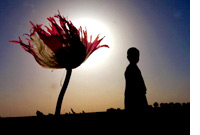
Image: AP/Wide World Photos
Early this spring, the Afghan government sent an armed patrol into the mountains east of Kabul to uproot the illegal opium fields. The local farmers of Nangarhar province fought back, taking up guns to defend the plants that feed their families. “The resistance was extremely fierce,” says Aziz Arya, an economist for the United Nations Food and Agriculture Organization, who was working nearby. “People were hurt on both sides.” More importantly, the government retreated, leaving most of the poppy intact.
Unfortunately, such clashes have become typical of modern day Afghanistan, where tribal chiefs and private armies still control the countryside and the official government struggles with scant resources in Kabul. American led security and reconstruction efforts are stumbling, say observers, leaving a vacuum that has increasingly been filled with the most profitable and deadly of crops. Last year opium production in Afghanistan increased 18 fold to 3,400 tons, leaving the fragile country once again responsible for more than 75 percent of the world’s heroin. The harvest this summer is expected to break new records, owing to high prices and new poppy fields in the country’s most remote reaches.
This resurgence is among the greatest threats to the country’s stability. Ashraf Ghani, the nation’s finance minister, recently warned that Afghanistan could soon revert to a “narco-mafia” state. As it stands, the lawless and tribal foes of Hamid Karzai’s government outside Kabul have become the country’s primary moneymen. Warlords and militias oversaw a crop harvest worth more than $1.2 billion in 2002, according to the United Nations, more than twice as much as the Afghan government’s annual operating budget.
The long-term solution, say international experts, will take more than an increase in the number of armed raids out of Kabul. “It’s the rebuilding of the country that we are talking about here,” says Harry Shapiro of DrugScope, a British think tank that follows the international drug trade. “I don’t know if there is enough overseas aid to do that.” In many regions, opium forms the heart of the economy. Without adequate roads, irrigation or alternate financing, farmers have no choice but to grow poppy. “Even the people who grow it, they understand that there is lots of bad from what they grow,” explains Arya, who worked closely with the Nangarhar farmers. “At the same time they are saying, ‘What should we eat? What should our children eat?’ ”
International donors have pledged to offer alternatives, but their efforts so far are falling short. Less than 61 percent of the country’s first year reconstruction needs have been met by international donors, using the lowest cost estimate of $1.7 billion provided by the World Bank, according to an analysis by Barnett R. Rubin, a political scientist at New York University. Using the more generous funding goals set by the Afghan government, the amount of spending has barely covered a third of the country’s needs.
The United States, distracted by Iraq, has done little to improve these numbers. “We will work to help Afghanistan to develop an economy that can feed his people,” President Bush said in April 2002. But so far, the U.S. has focused its efforts on seeking out Al Qaeda instead. The White House picked up only a small portion of the initial reconstruction bill, pledging just $300 million of the $5.2 billion raised at the first donor’s conference in 2002. More recently, the Bush administration failed to fund Afghan reconstruction in its January budget proposal (an oversight that was fixed by Congress), and it cut the State Department’s $75 million request for continuing Afghan anti-narcotics efforts to $40 million. Congress approved an additional $337 million for Afghanistan as part of the Iraq war supplemental in April, about a third as much as the same bill gave Israel, Jordan and Turkey, and less than 10 percent what it gave to the U.S. airline industry.
“Our decision not to deploy a peacekeeping force leaves us without real instruments to address the problem, ” says James Dobbins, Bush’s envoy to Afghanistan in 2001, noting the isolation of the government in Kabul. “I don’t think anyone in the US government took it [opium] all that seriously.” The lack of leadership has left some embarrassing comparisons to other recent post-conflict situations. Next to Afghanistan, the international community spent four times more per person on reconstruction following the conflicts in Kosovo and Bosnia, and more than twice as much on Rwanda.
The repercussions of this policy are bleeding through the Afghan borders. A study in 2001, found that 15 percent of the American heroin market came from South West Asia, up from 6 percent in 1999. About 95 percent of British heroin comes from Afghanistan. But the hardest hit countries are those immediately bordering the poppy fields. Uzbekistan, Kazakhstan, Kyrgyzstan and Tajikistan host the world’s fastest growing AIDS epidemics, according to the United Nations. Eighty-eight percent of new cases can be traced to intravenous drug use, which has been rapidly growing since the mid-1990s.
Meanwhile, the officials charged with overseeing the eradication are predicting a long haul. If things do eventually get better, they will likely get worse first. “Afghanistan is as unstable as it was before the American coalition went in, ” says Tamara Makarenko an expert in Central Asian crime at the University of St. Andrews in Scotland. “Right now, as it sits on the ground, there is very little to show that things are improving.”
Mohammad Amirkhizi, who leads the United Nations anti-drug program in Kabul, is more diplomatic. “In order to reduce poppy cultivation, alternative livelihoods need to be made available to the farmers,” he explained in an recent email to a reporter, since the phones in Kabul work sporadically. “This can only be done over the long term.”










